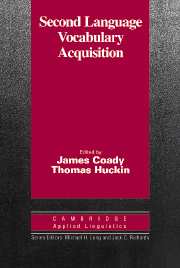Series editors' preface
Published online by Cambridge University Press: 05 October 2012
Summary
The relative neglect of studies of vocabulary acquisition and related areas of lexical research in second language acquisition has often been commented on within the fields of language teaching and applied linguistics. Compared to work in grammar, phonology, and discourse studies, much less is known about the nature of the second language learners' lexicon. Yet adequate theories of L2 vocabulary acquisition and use are central to a wide range of issues in applied linguistics, including performance assessment, proficiency testing, curriculum development, and applied lexicography. Fortunately, since the mid-1980s there has been a renewed interest in the role of vocabulary in second language learning, and this has seen a growing body of empirically based studies of such issues as the nature of the bilingual lexicon, vocabulary acquisition, lexical storage, lexical retrieval, and use of vocabulary by second language learners.
Second Language Vocabulary Acquisition will be of great interest to those interested in current views on the nature of L2 vocabulary acquisition and approaches to L2 vocabulary teaching. It provides a useful introduction to the current state of theory and research, examines the topic of vocabulary learning and teaching from a number of perspectives, and presents a comprehensive range of papers that explore such issues as the nature of lexical competence, the measurement of vocabulary knowledge and growth, the role of vocabulary in L2 reading and listening, speaking and writing, the relations between L1 and L2 vocabulary, as well as pedagogical approaches to the teaching of vocabulary.
- Type
- Chapter
- Information
- Second Language Vocabulary AcquisitionA Rationale for Pedagogy, pp. ix - xPublisher: Cambridge University PressPrint publication year: 1996



